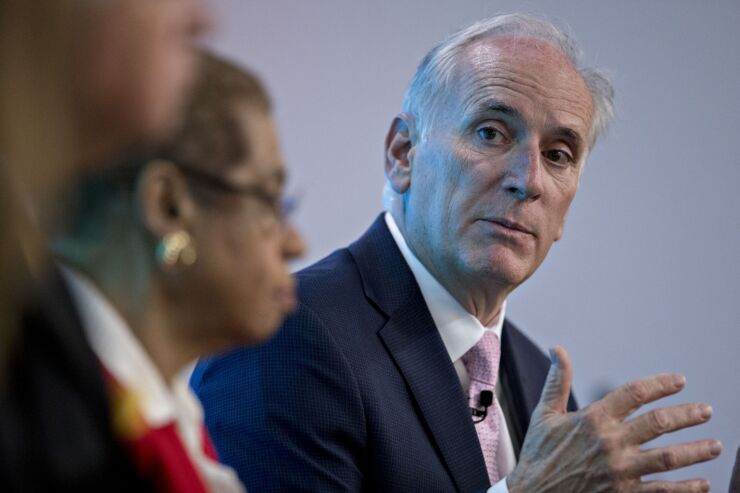Large public transit issuers are faltering under pandemic pressures, and seeking more federal aid than they are likely to get to see them through.
The American Public Transportation Association is asking Congress for at least $32 billion in additional emergency funding in a future COVID-19 relief bill, a figure experts think is unlikely to be granted.
In a virtual press conference Tuesday, APTA President and CEO Paul Skoutelas said he was disappointed that a bill proposed by Senate Republicans did not include funding for public transit.
“Additional funds are critical to maintain the manufacturing and supply chain and limit the enormous economic damage to public transportation businesses that are caused by the crisis,” Skoutelas said.
Senate Republicans proposed a $1 trillion HEALS Act package late Monday that provides $10 billion for airports, which some observers believe opens the door for more negotiations on funding for public transit systems.
The CARES Act, passed in late March, gave public transit $25 billion. Those funds helped the Washington Metropolitan Area Transit Authority keep its employees working and brought back more services, said Paul Wiedefeld, WMATA’s general manager and CEO.

WMATA fare revenues are down by 90% and Wiedefeld said CARES Act funds will dry up later this year.
“We need federal assistance,” Wiedefeld said. “The harsh reality is that without additional federal funds, it leaves us with some very difficult choices to deal with this financial crisis, one that runs counter to the economic recovery we all want to see.”
It is still unlikely that public transit agencies will get their full $32 billion ask, said Marc Scribner, senior transportation policy analyst at the Reason Foundation.
According to the Federal Transit Administration, as of July 23, public transit agencies had already obligated 80% of CARES Act funds or about $20 billion.
“That doesn’t bode well for future bailouts succeeding on any sort of measurable standard,” Scribner said.
In May, House Democrats’ HEROES Act proposed a $3 trillion stimulus that included $15.75 billion to be spent on emergency transit relief to maintain basic transit services, with $11.75 billion distributed through formula aid and $4 billion through applications to the secretary of transportation.
“The fact they (Senate Republicans) included any transportation infrastructure dedicated funding in their opening sell indicates that they’re probably willing to negotiate some of those issues already raised in the House,” Scribner said.
There is a big difference between the House and Senate relief bills, said Joseph Krist, a longtime muni analyst who is publisher of the Muni Credit News. This comes as all public transit agencies need more money, he said.
“Some I would say are a little better positioned to withstand things, but with things shutting down, the argument that I would make that some are a little better may not hold,” Krist said.
Funding for public transportation could also depend on the upcoming November elections, Krist said, arguing that Senators in tough reelection battles might be more inclined to push for aid. More than half of Senate seats up for election in 2020.
“A lot of it will be determined by what Congress believes is the outlook for them,” Krist said. “If these guys defending Senate seats really think they might lose, who knows what they may do?”
The New York Metropolitan Transportation Authority is in a tough spot. Public transit agencies often back their bonds through sales tax revenue, but others like MTA, a large issuer of municipal bonds, funds those bonds through farebox revenue.
MTA’s Chairman Patrick Foye said
MTA is facing a projected $16 billion deficit through 2024. It will exhaust $3.9 billion under the CARES Act at the end of the month. It requested the same amount in the HEROES Act.
Other transit agencies may be better off since their bonds are backed by sales taxes, Krist said, such as the Metropolitan Atlanta Rapid Transit Authority and the Los Angeles County Metropolitan Transportation Authority.
“Those at least are able to get some money generated even if nobody is able to use the basic service that they finance,” Krist said.
Transit agencies have had to cut capital investment and 18% of agencies have shifted funds from their capital budget to their operating budget, according to an APTA survey. More than a third of agencies had to delay or cancel capital projects due to the pandemic.
Unprecedented expenditures coupled with the decrease of $10 million in the revenue forecast for next year will have an impact on future projects, said Inez Evans, president and CEO at IndyGo, Indiana’s bus transit system.
IndyGo
“This will have a significant impact on IndyGo’s ability to advance the projects that we’ve promised our riders, our community such as a frequent grid network that was originally planned to be rolled out last month,” Evans said. “All of those things are being placed on hold.”





